Importance of Proactive Absence Management and Training Evaluation in HRM
VerifiedAdded on 2023/01/19
|11
|3622
|27
AI Summary
This report discusses the importance of proactively managing high levels of absence and evaluating training in human resource management. It also explores the U-Curve Framework for cross-cultural adjustment of expatriate employees. The case study is based on Tesco, a multinational grocery and general merchandise retailer.
Contribute Materials
Your contribution can guide someone’s learning journey. Share your
documents today.
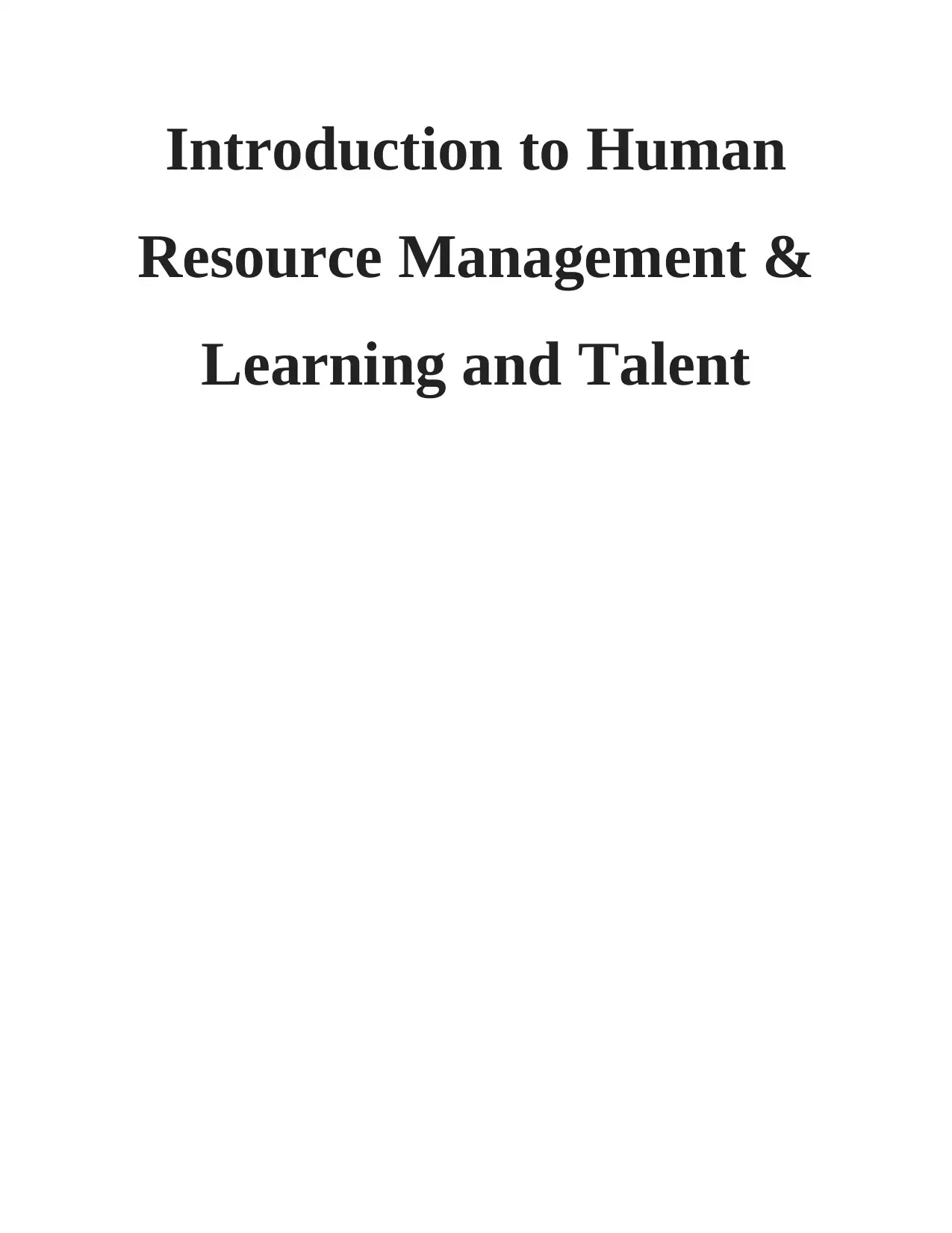
Introduction to Human
Resource Management &
Learning and Talent
Resource Management &
Learning and Talent
Secure Best Marks with AI Grader
Need help grading? Try our AI Grader for instant feedback on your assignments.
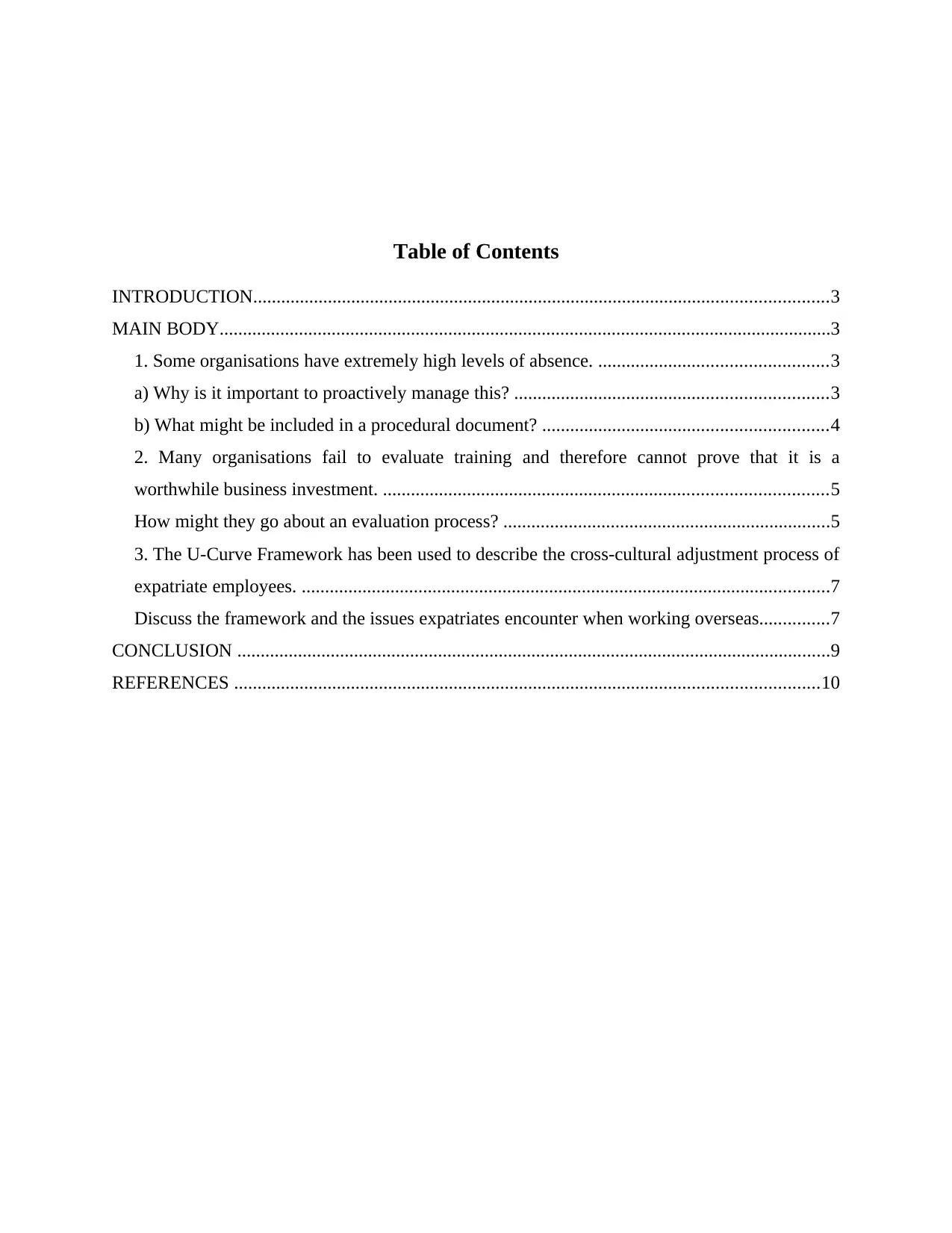
Table of Contents
INTRODUCTION...........................................................................................................................3
MAIN BODY...................................................................................................................................3
1. Some organisations have extremely high levels of absence. .................................................3
a) Why is it important to proactively manage this? ...................................................................3
b) What might be included in a procedural document? .............................................................4
2. Many organisations fail to evaluate training and therefore cannot prove that it is a
worthwhile business investment. ...............................................................................................5
How might they go about an evaluation process? ......................................................................5
3. The U-Curve Framework has been used to describe the cross-cultural adjustment process of
expatriate employees. .................................................................................................................7
Discuss the framework and the issues expatriates encounter when working overseas...............7
CONCLUSION ...............................................................................................................................9
REFERENCES .............................................................................................................................10
INTRODUCTION...........................................................................................................................3
MAIN BODY...................................................................................................................................3
1. Some organisations have extremely high levels of absence. .................................................3
a) Why is it important to proactively manage this? ...................................................................3
b) What might be included in a procedural document? .............................................................4
2. Many organisations fail to evaluate training and therefore cannot prove that it is a
worthwhile business investment. ...............................................................................................5
How might they go about an evaluation process? ......................................................................5
3. The U-Curve Framework has been used to describe the cross-cultural adjustment process of
expatriate employees. .................................................................................................................7
Discuss the framework and the issues expatriates encounter when working overseas...............7
CONCLUSION ...............................................................................................................................9
REFERENCES .............................................................................................................................10
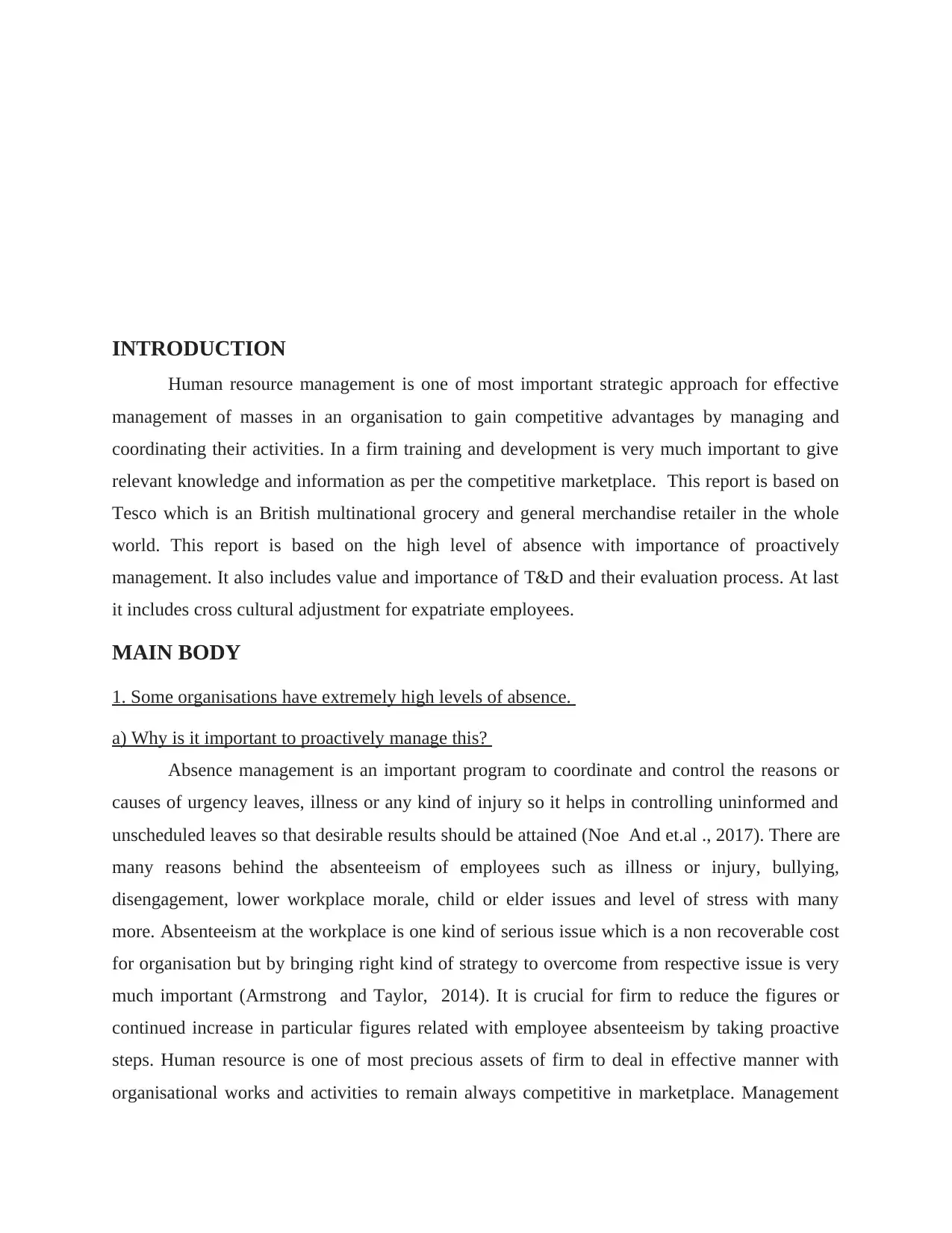
INTRODUCTION
Human resource management is one of most important strategic approach for effective
management of masses in an organisation to gain competitive advantages by managing and
coordinating their activities. In a firm training and development is very much important to give
relevant knowledge and information as per the competitive marketplace. This report is based on
Tesco which is an British multinational grocery and general merchandise retailer in the whole
world. This report is based on the high level of absence with importance of proactively
management. It also includes value and importance of T&D and their evaluation process. At last
it includes cross cultural adjustment for expatriate employees.
MAIN BODY
1. Some organisations have extremely high levels of absence.
a) Why is it important to proactively manage this?
Absence management is an important program to coordinate and control the reasons or
causes of urgency leaves, illness or any kind of injury so it helps in controlling uninformed and
unscheduled leaves so that desirable results should be attained (Noe And et.al ., 2017). There are
many reasons behind the absenteeism of employees such as illness or injury, bullying,
disengagement, lower workplace morale, child or elder issues and level of stress with many
more. Absenteeism at the workplace is one kind of serious issue which is a non recoverable cost
for organisation but by bringing right kind of strategy to overcome from respective issue is very
much important (Armstrong and Taylor, 2014). It is crucial for firm to reduce the figures or
continued increase in particular figures related with employee absenteeism by taking proactive
steps. Human resource is one of most precious assets of firm to deal in effective manner with
organisational works and activities to remain always competitive in marketplace. Management
Human resource management is one of most important strategic approach for effective
management of masses in an organisation to gain competitive advantages by managing and
coordinating their activities. In a firm training and development is very much important to give
relevant knowledge and information as per the competitive marketplace. This report is based on
Tesco which is an British multinational grocery and general merchandise retailer in the whole
world. This report is based on the high level of absence with importance of proactively
management. It also includes value and importance of T&D and their evaluation process. At last
it includes cross cultural adjustment for expatriate employees.
MAIN BODY
1. Some organisations have extremely high levels of absence.
a) Why is it important to proactively manage this?
Absence management is an important program to coordinate and control the reasons or
causes of urgency leaves, illness or any kind of injury so it helps in controlling uninformed and
unscheduled leaves so that desirable results should be attained (Noe And et.al ., 2017). There are
many reasons behind the absenteeism of employees such as illness or injury, bullying,
disengagement, lower workplace morale, child or elder issues and level of stress with many
more. Absenteeism at the workplace is one kind of serious issue which is a non recoverable cost
for organisation but by bringing right kind of strategy to overcome from respective issue is very
much important (Armstrong and Taylor, 2014). It is crucial for firm to reduce the figures or
continued increase in particular figures related with employee absenteeism by taking proactive
steps. Human resource is one of most precious assets of firm to deal in effective manner with
organisational works and activities to remain always competitive in marketplace. Management
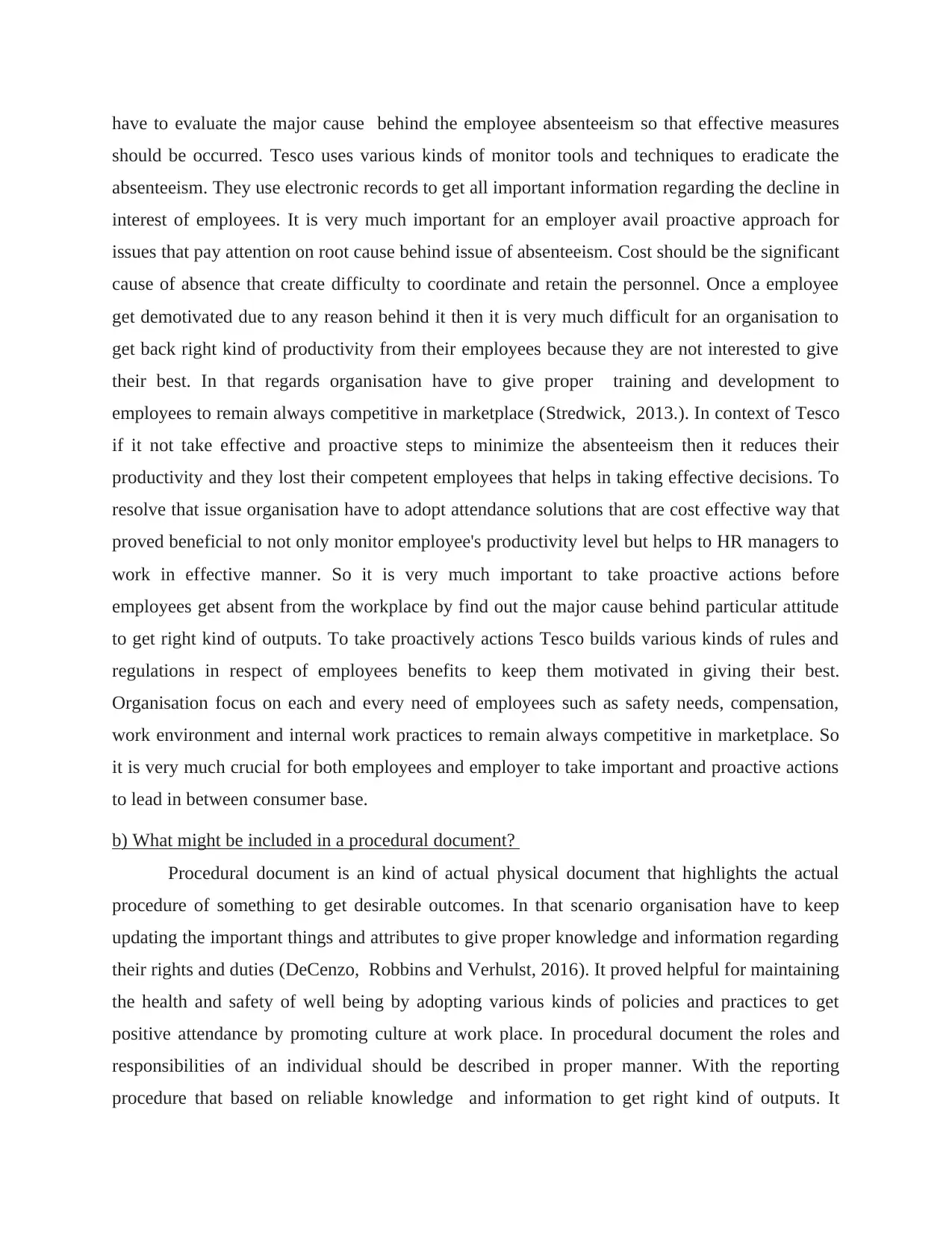
have to evaluate the major cause behind the employee absenteeism so that effective measures
should be occurred. Tesco uses various kinds of monitor tools and techniques to eradicate the
absenteeism. They use electronic records to get all important information regarding the decline in
interest of employees. It is very much important for an employer avail proactive approach for
issues that pay attention on root cause behind issue of absenteeism. Cost should be the significant
cause of absence that create difficulty to coordinate and retain the personnel. Once a employee
get demotivated due to any reason behind it then it is very much difficult for an organisation to
get back right kind of productivity from their employees because they are not interested to give
their best. In that regards organisation have to give proper training and development to
employees to remain always competitive in marketplace (Stredwick, 2013.). In context of Tesco
if it not take effective and proactive steps to minimize the absenteeism then it reduces their
productivity and they lost their competent employees that helps in taking effective decisions. To
resolve that issue organisation have to adopt attendance solutions that are cost effective way that
proved beneficial to not only monitor employee's productivity level but helps to HR managers to
work in effective manner. So it is very much important to take proactive actions before
employees get absent from the workplace by find out the major cause behind particular attitude
to get right kind of outputs. To take proactively actions Tesco builds various kinds of rules and
regulations in respect of employees benefits to keep them motivated in giving their best.
Organisation focus on each and every need of employees such as safety needs, compensation,
work environment and internal work practices to remain always competitive in marketplace. So
it is very much crucial for both employees and employer to take important and proactive actions
to lead in between consumer base.
b) What might be included in a procedural document?
Procedural document is an kind of actual physical document that highlights the actual
procedure of something to get desirable outcomes. In that scenario organisation have to keep
updating the important things and attributes to give proper knowledge and information regarding
their rights and duties (DeCenzo, Robbins and Verhulst, 2016). It proved helpful for maintaining
the health and safety of well being by adopting various kinds of policies and practices to get
positive attendance by promoting culture at work place. In procedural document the roles and
responsibilities of an individual should be described in proper manner. With the reporting
procedure that based on reliable knowledge and information to get right kind of outputs. It
should be occurred. Tesco uses various kinds of monitor tools and techniques to eradicate the
absenteeism. They use electronic records to get all important information regarding the decline in
interest of employees. It is very much important for an employer avail proactive approach for
issues that pay attention on root cause behind issue of absenteeism. Cost should be the significant
cause of absence that create difficulty to coordinate and retain the personnel. Once a employee
get demotivated due to any reason behind it then it is very much difficult for an organisation to
get back right kind of productivity from their employees because they are not interested to give
their best. In that regards organisation have to give proper training and development to
employees to remain always competitive in marketplace (Stredwick, 2013.). In context of Tesco
if it not take effective and proactive steps to minimize the absenteeism then it reduces their
productivity and they lost their competent employees that helps in taking effective decisions. To
resolve that issue organisation have to adopt attendance solutions that are cost effective way that
proved beneficial to not only monitor employee's productivity level but helps to HR managers to
work in effective manner. So it is very much important to take proactive actions before
employees get absent from the workplace by find out the major cause behind particular attitude
to get right kind of outputs. To take proactively actions Tesco builds various kinds of rules and
regulations in respect of employees benefits to keep them motivated in giving their best.
Organisation focus on each and every need of employees such as safety needs, compensation,
work environment and internal work practices to remain always competitive in marketplace. So
it is very much crucial for both employees and employer to take important and proactive actions
to lead in between consumer base.
b) What might be included in a procedural document?
Procedural document is an kind of actual physical document that highlights the actual
procedure of something to get desirable outcomes. In that scenario organisation have to keep
updating the important things and attributes to give proper knowledge and information regarding
their rights and duties (DeCenzo, Robbins and Verhulst, 2016). It proved helpful for maintaining
the health and safety of well being by adopting various kinds of policies and practices to get
positive attendance by promoting culture at work place. In procedural document the roles and
responsibilities of an individual should be described in proper manner. With the reporting
procedure that based on reliable knowledge and information to get right kind of outputs. It
Secure Best Marks with AI Grader
Need help grading? Try our AI Grader for instant feedback on your assignments.
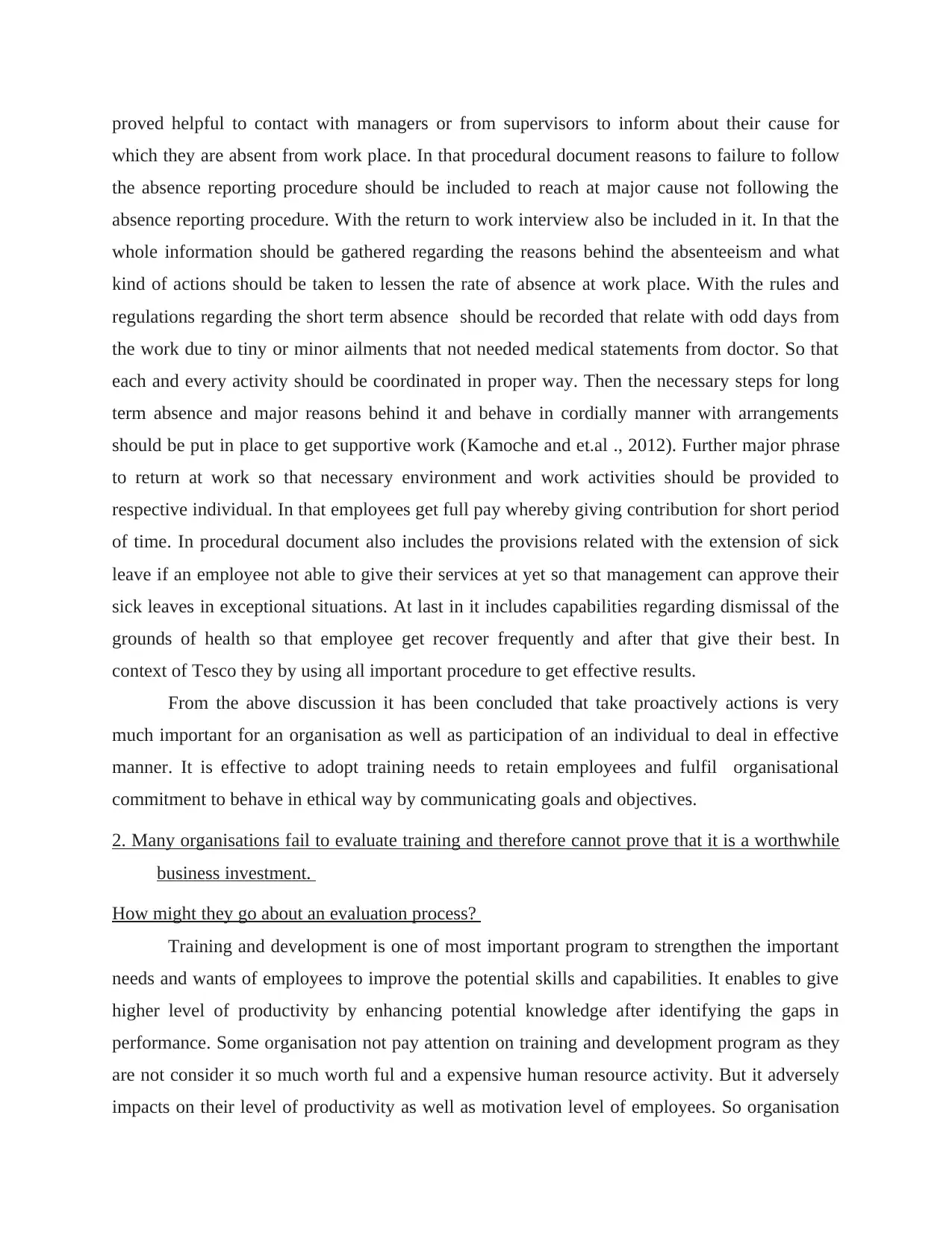
proved helpful to contact with managers or from supervisors to inform about their cause for
which they are absent from work place. In that procedural document reasons to failure to follow
the absence reporting procedure should be included to reach at major cause not following the
absence reporting procedure. With the return to work interview also be included in it. In that the
whole information should be gathered regarding the reasons behind the absenteeism and what
kind of actions should be taken to lessen the rate of absence at work place. With the rules and
regulations regarding the short term absence should be recorded that relate with odd days from
the work due to tiny or minor ailments that not needed medical statements from doctor. So that
each and every activity should be coordinated in proper way. Then the necessary steps for long
term absence and major reasons behind it and behave in cordially manner with arrangements
should be put in place to get supportive work (Kamoche and et.al ., 2012). Further major phrase
to return at work so that necessary environment and work activities should be provided to
respective individual. In that employees get full pay whereby giving contribution for short period
of time. In procedural document also includes the provisions related with the extension of sick
leave if an employee not able to give their services at yet so that management can approve their
sick leaves in exceptional situations. At last in it includes capabilities regarding dismissal of the
grounds of health so that employee get recover frequently and after that give their best. In
context of Tesco they by using all important procedure to get effective results.
From the above discussion it has been concluded that take proactively actions is very
much important for an organisation as well as participation of an individual to deal in effective
manner. It is effective to adopt training needs to retain employees and fulfil organisational
commitment to behave in ethical way by communicating goals and objectives.
2. Many organisations fail to evaluate training and therefore cannot prove that it is a worthwhile
business investment.
How might they go about an evaluation process?
Training and development is one of most important program to strengthen the important
needs and wants of employees to improve the potential skills and capabilities. It enables to give
higher level of productivity by enhancing potential knowledge after identifying the gaps in
performance. Some organisation not pay attention on training and development program as they
are not consider it so much worth ful and a expensive human resource activity. But it adversely
impacts on their level of productivity as well as motivation level of employees. So organisation
which they are absent from work place. In that procedural document reasons to failure to follow
the absence reporting procedure should be included to reach at major cause not following the
absence reporting procedure. With the return to work interview also be included in it. In that the
whole information should be gathered regarding the reasons behind the absenteeism and what
kind of actions should be taken to lessen the rate of absence at work place. With the rules and
regulations regarding the short term absence should be recorded that relate with odd days from
the work due to tiny or minor ailments that not needed medical statements from doctor. So that
each and every activity should be coordinated in proper way. Then the necessary steps for long
term absence and major reasons behind it and behave in cordially manner with arrangements
should be put in place to get supportive work (Kamoche and et.al ., 2012). Further major phrase
to return at work so that necessary environment and work activities should be provided to
respective individual. In that employees get full pay whereby giving contribution for short period
of time. In procedural document also includes the provisions related with the extension of sick
leave if an employee not able to give their services at yet so that management can approve their
sick leaves in exceptional situations. At last in it includes capabilities regarding dismissal of the
grounds of health so that employee get recover frequently and after that give their best. In
context of Tesco they by using all important procedure to get effective results.
From the above discussion it has been concluded that take proactively actions is very
much important for an organisation as well as participation of an individual to deal in effective
manner. It is effective to adopt training needs to retain employees and fulfil organisational
commitment to behave in ethical way by communicating goals and objectives.
2. Many organisations fail to evaluate training and therefore cannot prove that it is a worthwhile
business investment.
How might they go about an evaluation process?
Training and development is one of most important program to strengthen the important
needs and wants of employees to improve the potential skills and capabilities. It enables to give
higher level of productivity by enhancing potential knowledge after identifying the gaps in
performance. Some organisation not pay attention on training and development program as they
are not consider it so much worth ful and a expensive human resource activity. But it adversely
impacts on their level of productivity as well as motivation level of employees. So organisation
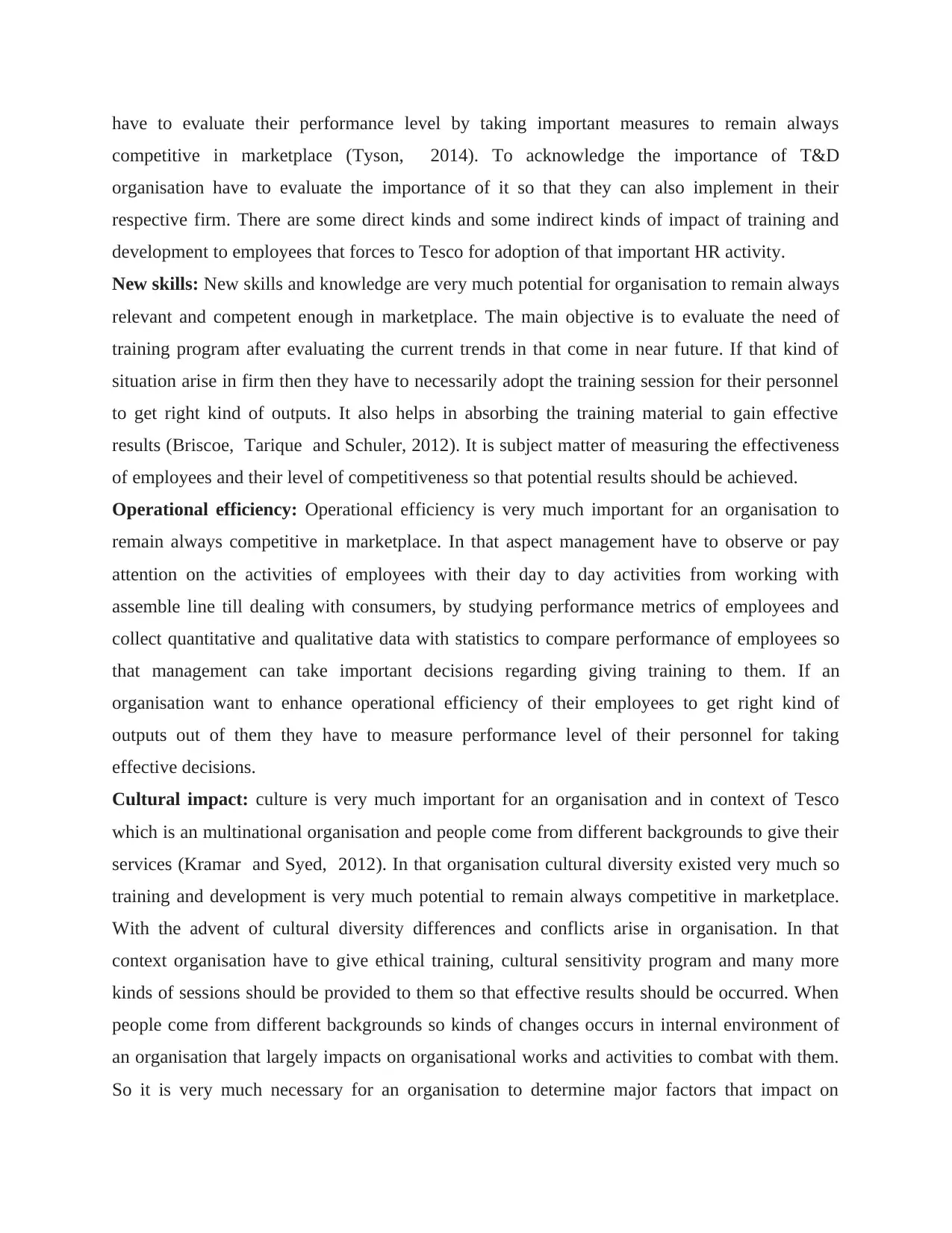
have to evaluate their performance level by taking important measures to remain always
competitive in marketplace (Tyson, 2014). To acknowledge the importance of T&D
organisation have to evaluate the importance of it so that they can also implement in their
respective firm. There are some direct kinds and some indirect kinds of impact of training and
development to employees that forces to Tesco for adoption of that important HR activity.
New skills: New skills and knowledge are very much potential for organisation to remain always
relevant and competent enough in marketplace. The main objective is to evaluate the need of
training program after evaluating the current trends in that come in near future. If that kind of
situation arise in firm then they have to necessarily adopt the training session for their personnel
to get right kind of outputs. It also helps in absorbing the training material to gain effective
results (Briscoe, Tarique and Schuler, 2012). It is subject matter of measuring the effectiveness
of employees and their level of competitiveness so that potential results should be achieved.
Operational efficiency: Operational efficiency is very much important for an organisation to
remain always competitive in marketplace. In that aspect management have to observe or pay
attention on the activities of employees with their day to day activities from working with
assemble line till dealing with consumers, by studying performance metrics of employees and
collect quantitative and qualitative data with statistics to compare performance of employees so
that management can take important decisions regarding giving training to them. If an
organisation want to enhance operational efficiency of their employees to get right kind of
outputs out of them they have to measure performance level of their personnel for taking
effective decisions.
Cultural impact: culture is very much important for an organisation and in context of Tesco
which is an multinational organisation and people come from different backgrounds to give their
services (Kramar and Syed, 2012). In that organisation cultural diversity existed very much so
training and development is very much potential to remain always competitive in marketplace.
With the advent of cultural diversity differences and conflicts arise in organisation. In that
context organisation have to give ethical training, cultural sensitivity program and many more
kinds of sessions should be provided to them so that effective results should be occurred. When
people come from different backgrounds so kinds of changes occurs in internal environment of
an organisation that largely impacts on organisational works and activities to combat with them.
So it is very much necessary for an organisation to determine major factors that impact on
competitive in marketplace (Tyson, 2014). To acknowledge the importance of T&D
organisation have to evaluate the importance of it so that they can also implement in their
respective firm. There are some direct kinds and some indirect kinds of impact of training and
development to employees that forces to Tesco for adoption of that important HR activity.
New skills: New skills and knowledge are very much potential for organisation to remain always
relevant and competent enough in marketplace. The main objective is to evaluate the need of
training program after evaluating the current trends in that come in near future. If that kind of
situation arise in firm then they have to necessarily adopt the training session for their personnel
to get right kind of outputs. It also helps in absorbing the training material to gain effective
results (Briscoe, Tarique and Schuler, 2012). It is subject matter of measuring the effectiveness
of employees and their level of competitiveness so that potential results should be achieved.
Operational efficiency: Operational efficiency is very much important for an organisation to
remain always competitive in marketplace. In that aspect management have to observe or pay
attention on the activities of employees with their day to day activities from working with
assemble line till dealing with consumers, by studying performance metrics of employees and
collect quantitative and qualitative data with statistics to compare performance of employees so
that management can take important decisions regarding giving training to them. If an
organisation want to enhance operational efficiency of their employees to get right kind of
outputs out of them they have to measure performance level of their personnel for taking
effective decisions.
Cultural impact: culture is very much important for an organisation and in context of Tesco
which is an multinational organisation and people come from different backgrounds to give their
services (Kramar and Syed, 2012). In that organisation cultural diversity existed very much so
training and development is very much potential to remain always competitive in marketplace.
With the advent of cultural diversity differences and conflicts arise in organisation. In that
context organisation have to give ethical training, cultural sensitivity program and many more
kinds of sessions should be provided to them so that effective results should be occurred. When
people come from different backgrounds so kinds of changes occurs in internal environment of
an organisation that largely impacts on organisational works and activities to combat with them.
So it is very much necessary for an organisation to determine major factors that impact on
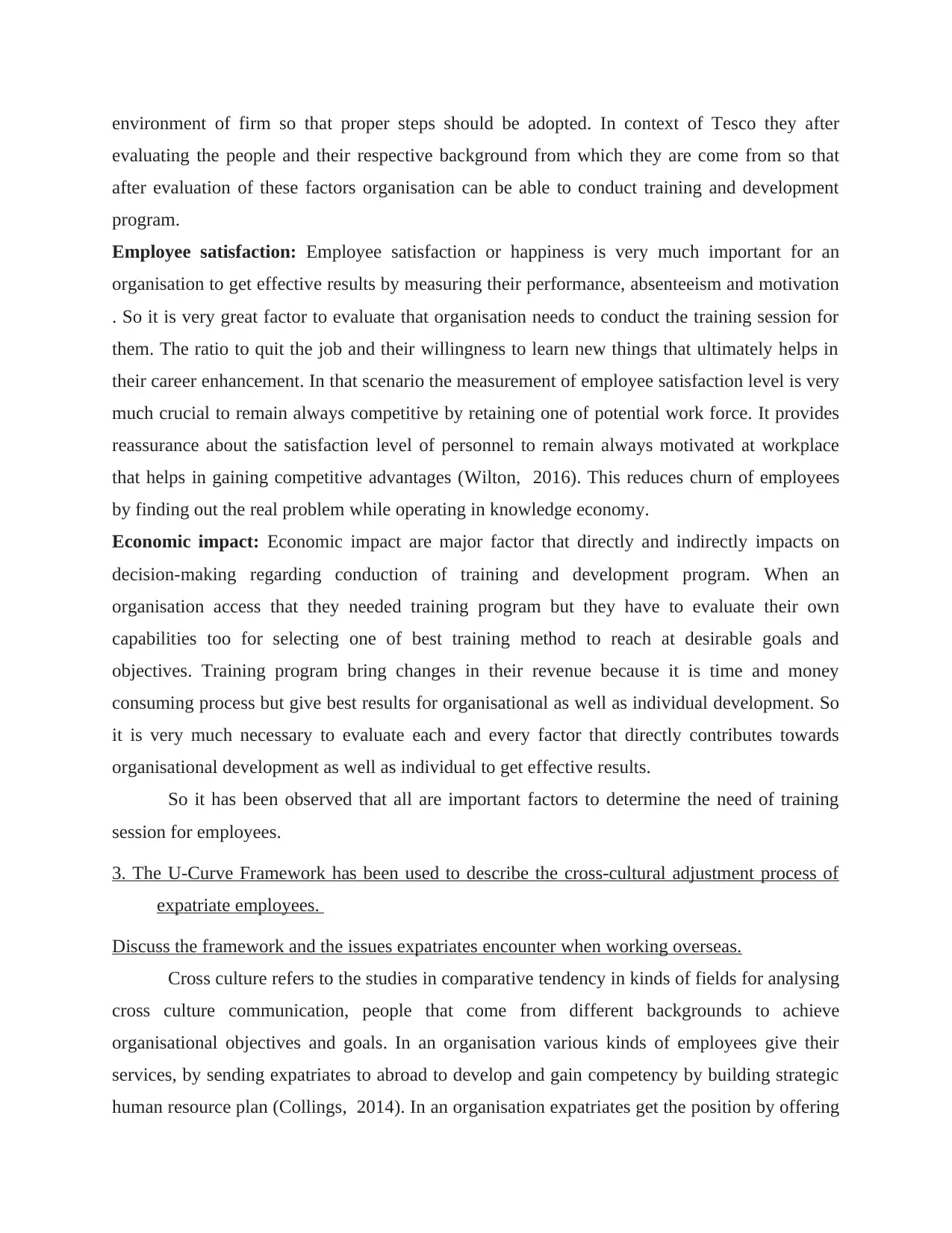
environment of firm so that proper steps should be adopted. In context of Tesco they after
evaluating the people and their respective background from which they are come from so that
after evaluation of these factors organisation can be able to conduct training and development
program.
Employee satisfaction: Employee satisfaction or happiness is very much important for an
organisation to get effective results by measuring their performance, absenteeism and motivation
. So it is very great factor to evaluate that organisation needs to conduct the training session for
them. The ratio to quit the job and their willingness to learn new things that ultimately helps in
their career enhancement. In that scenario the measurement of employee satisfaction level is very
much crucial to remain always competitive by retaining one of potential work force. It provides
reassurance about the satisfaction level of personnel to remain always motivated at workplace
that helps in gaining competitive advantages (Wilton, 2016). This reduces churn of employees
by finding out the real problem while operating in knowledge economy.
Economic impact: Economic impact are major factor that directly and indirectly impacts on
decision-making regarding conduction of training and development program. When an
organisation access that they needed training program but they have to evaluate their own
capabilities too for selecting one of best training method to reach at desirable goals and
objectives. Training program bring changes in their revenue because it is time and money
consuming process but give best results for organisational as well as individual development. So
it is very much necessary to evaluate each and every factor that directly contributes towards
organisational development as well as individual to get effective results.
So it has been observed that all are important factors to determine the need of training
session for employees.
3. The U-Curve Framework has been used to describe the cross-cultural adjustment process of
expatriate employees.
Discuss the framework and the issues expatriates encounter when working overseas.
Cross culture refers to the studies in comparative tendency in kinds of fields for analysing
cross culture communication, people that come from different backgrounds to achieve
organisational objectives and goals. In an organisation various kinds of employees give their
services, by sending expatriates to abroad to develop and gain competency by building strategic
human resource plan (Collings, 2014). In an organisation expatriates get the position by offering
evaluating the people and their respective background from which they are come from so that
after evaluation of these factors organisation can be able to conduct training and development
program.
Employee satisfaction: Employee satisfaction or happiness is very much important for an
organisation to get effective results by measuring their performance, absenteeism and motivation
. So it is very great factor to evaluate that organisation needs to conduct the training session for
them. The ratio to quit the job and their willingness to learn new things that ultimately helps in
their career enhancement. In that scenario the measurement of employee satisfaction level is very
much crucial to remain always competitive by retaining one of potential work force. It provides
reassurance about the satisfaction level of personnel to remain always motivated at workplace
that helps in gaining competitive advantages (Wilton, 2016). This reduces churn of employees
by finding out the real problem while operating in knowledge economy.
Economic impact: Economic impact are major factor that directly and indirectly impacts on
decision-making regarding conduction of training and development program. When an
organisation access that they needed training program but they have to evaluate their own
capabilities too for selecting one of best training method to reach at desirable goals and
objectives. Training program bring changes in their revenue because it is time and money
consuming process but give best results for organisational as well as individual development. So
it is very much necessary to evaluate each and every factor that directly contributes towards
organisational development as well as individual to get effective results.
So it has been observed that all are important factors to determine the need of training
session for employees.
3. The U-Curve Framework has been used to describe the cross-cultural adjustment process of
expatriate employees.
Discuss the framework and the issues expatriates encounter when working overseas.
Cross culture refers to the studies in comparative tendency in kinds of fields for analysing
cross culture communication, people that come from different backgrounds to achieve
organisational objectives and goals. In an organisation various kinds of employees give their
services, by sending expatriates to abroad to develop and gain competency by building strategic
human resource plan (Collings, 2014). In an organisation expatriates get the position by offering
Paraphrase This Document
Need a fresh take? Get an instant paraphrase of this document with our AI Paraphraser
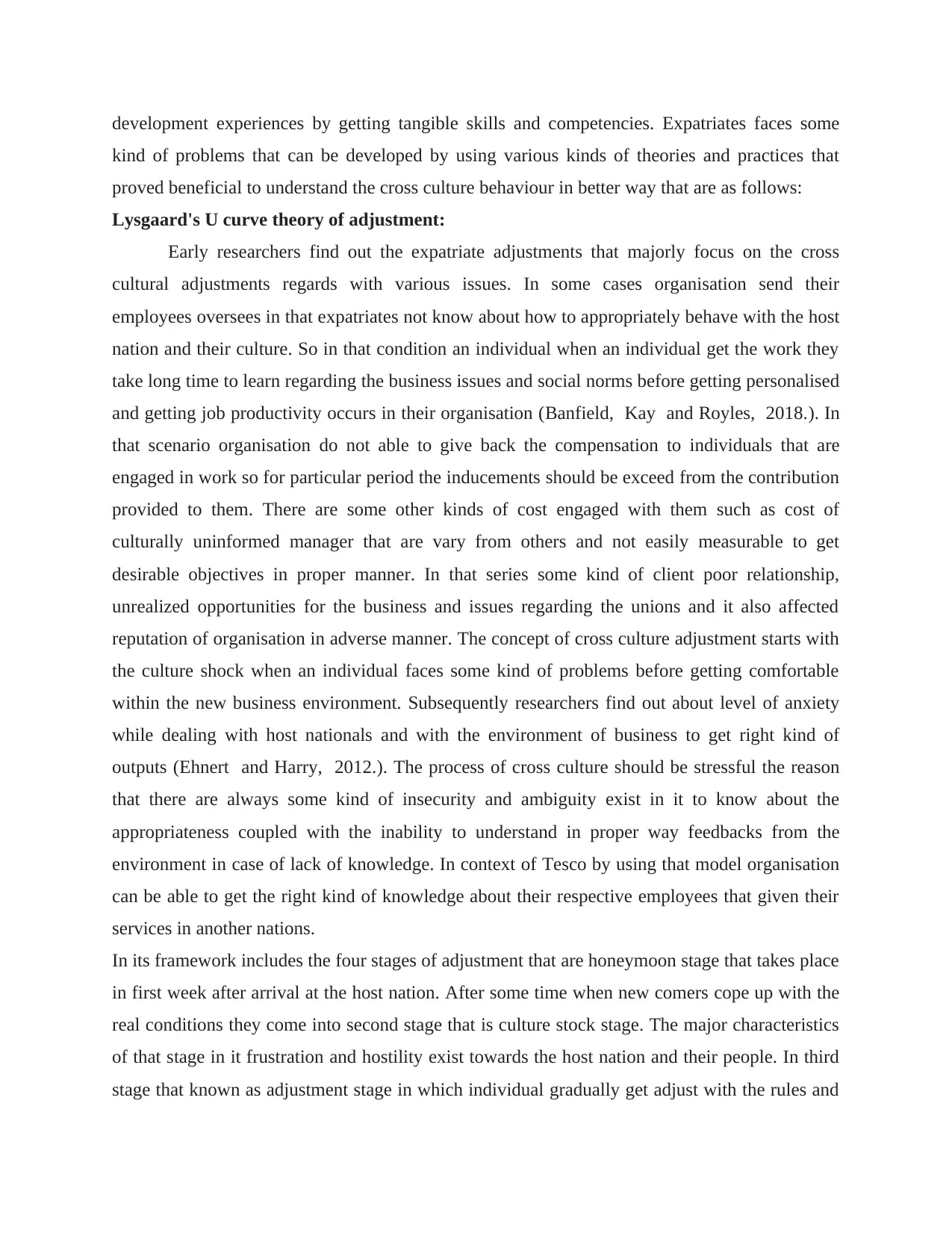
development experiences by getting tangible skills and competencies. Expatriates faces some
kind of problems that can be developed by using various kinds of theories and practices that
proved beneficial to understand the cross culture behaviour in better way that are as follows:
Lysgaard's U curve theory of adjustment:
Early researchers find out the expatriate adjustments that majorly focus on the cross
cultural adjustments regards with various issues. In some cases organisation send their
employees oversees in that expatriates not know about how to appropriately behave with the host
nation and their culture. So in that condition an individual when an individual get the work they
take long time to learn regarding the business issues and social norms before getting personalised
and getting job productivity occurs in their organisation (Banfield, Kay and Royles, 2018.). In
that scenario organisation do not able to give back the compensation to individuals that are
engaged in work so for particular period the inducements should be exceed from the contribution
provided to them. There are some other kinds of cost engaged with them such as cost of
culturally uninformed manager that are vary from others and not easily measurable to get
desirable objectives in proper manner. In that series some kind of client poor relationship,
unrealized opportunities for the business and issues regarding the unions and it also affected
reputation of organisation in adverse manner. The concept of cross culture adjustment starts with
the culture shock when an individual faces some kind of problems before getting comfortable
within the new business environment. Subsequently researchers find out about level of anxiety
while dealing with host nationals and with the environment of business to get right kind of
outputs (Ehnert and Harry, 2012.). The process of cross culture should be stressful the reason
that there are always some kind of insecurity and ambiguity exist in it to know about the
appropriateness coupled with the inability to understand in proper way feedbacks from the
environment in case of lack of knowledge. In context of Tesco by using that model organisation
can be able to get the right kind of knowledge about their respective employees that given their
services in another nations.
In its framework includes the four stages of adjustment that are honeymoon stage that takes place
in first week after arrival at the host nation. After some time when new comers cope up with the
real conditions they come into second stage that is culture stock stage. The major characteristics
of that stage in it frustration and hostility exist towards the host nation and their people. In third
stage that known as adjustment stage in which individual gradually get adjust with the rules and
kind of problems that can be developed by using various kinds of theories and practices that
proved beneficial to understand the cross culture behaviour in better way that are as follows:
Lysgaard's U curve theory of adjustment:
Early researchers find out the expatriate adjustments that majorly focus on the cross
cultural adjustments regards with various issues. In some cases organisation send their
employees oversees in that expatriates not know about how to appropriately behave with the host
nation and their culture. So in that condition an individual when an individual get the work they
take long time to learn regarding the business issues and social norms before getting personalised
and getting job productivity occurs in their organisation (Banfield, Kay and Royles, 2018.). In
that scenario organisation do not able to give back the compensation to individuals that are
engaged in work so for particular period the inducements should be exceed from the contribution
provided to them. There are some other kinds of cost engaged with them such as cost of
culturally uninformed manager that are vary from others and not easily measurable to get
desirable objectives in proper manner. In that series some kind of client poor relationship,
unrealized opportunities for the business and issues regarding the unions and it also affected
reputation of organisation in adverse manner. The concept of cross culture adjustment starts with
the culture shock when an individual faces some kind of problems before getting comfortable
within the new business environment. Subsequently researchers find out about level of anxiety
while dealing with host nationals and with the environment of business to get right kind of
outputs (Ehnert and Harry, 2012.). The process of cross culture should be stressful the reason
that there are always some kind of insecurity and ambiguity exist in it to know about the
appropriateness coupled with the inability to understand in proper way feedbacks from the
environment in case of lack of knowledge. In context of Tesco by using that model organisation
can be able to get the right kind of knowledge about their respective employees that given their
services in another nations.
In its framework includes the four stages of adjustment that are honeymoon stage that takes place
in first week after arrival at the host nation. After some time when new comers cope up with the
real conditions they come into second stage that is culture stock stage. The major characteristics
of that stage in it frustration and hostility exist towards the host nation and their people. In third
stage that known as adjustment stage in which individual gradually get adjust with the rules and
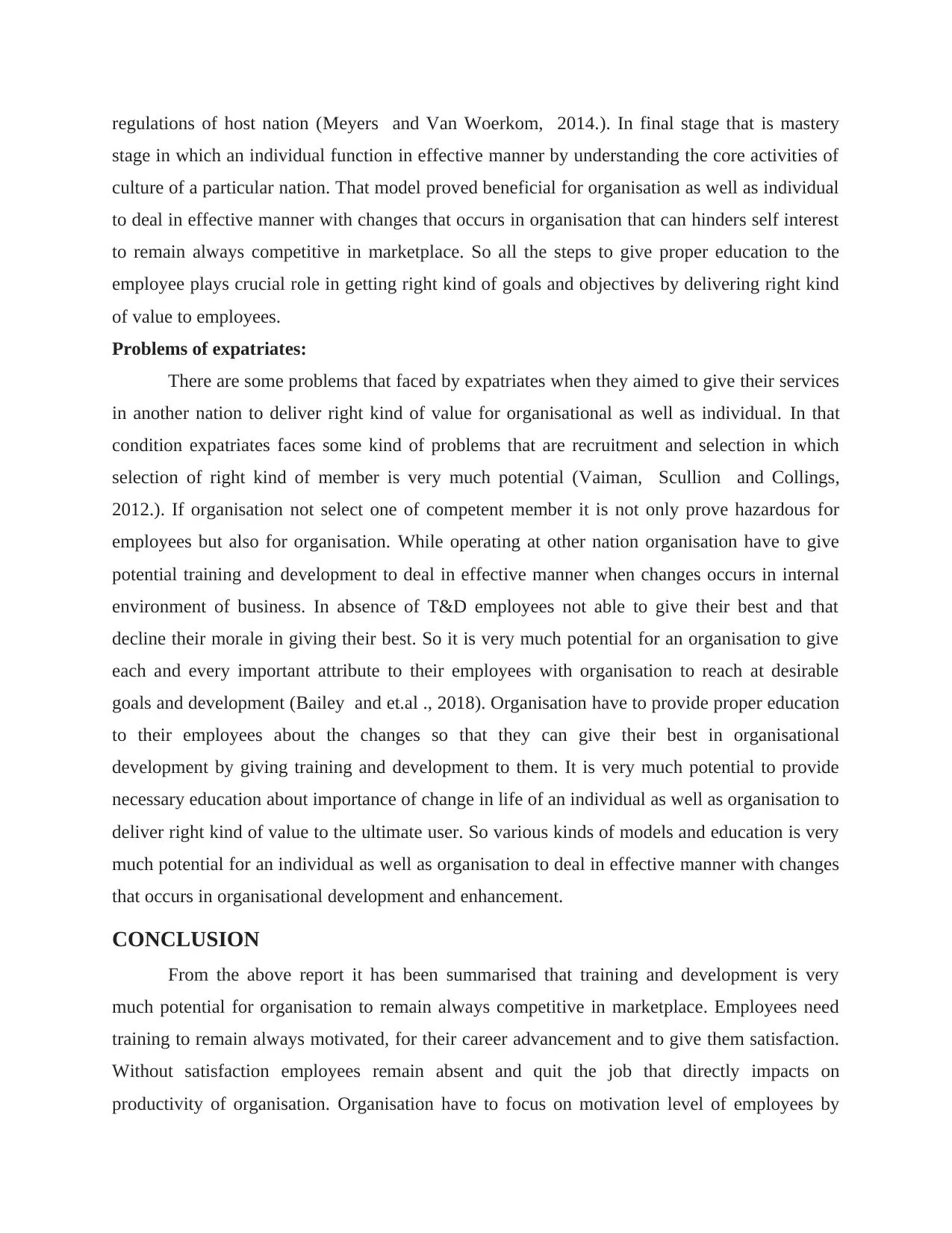
regulations of host nation (Meyers and Van Woerkom, 2014.). In final stage that is mastery
stage in which an individual function in effective manner by understanding the core activities of
culture of a particular nation. That model proved beneficial for organisation as well as individual
to deal in effective manner with changes that occurs in organisation that can hinders self interest
to remain always competitive in marketplace. So all the steps to give proper education to the
employee plays crucial role in getting right kind of goals and objectives by delivering right kind
of value to employees.
Problems of expatriates:
There are some problems that faced by expatriates when they aimed to give their services
in another nation to deliver right kind of value for organisational as well as individual. In that
condition expatriates faces some kind of problems that are recruitment and selection in which
selection of right kind of member is very much potential (Vaiman, Scullion and Collings,
2012.). If organisation not select one of competent member it is not only prove hazardous for
employees but also for organisation. While operating at other nation organisation have to give
potential training and development to deal in effective manner when changes occurs in internal
environment of business. In absence of T&D employees not able to give their best and that
decline their morale in giving their best. So it is very much potential for an organisation to give
each and every important attribute to their employees with organisation to reach at desirable
goals and development (Bailey and et.al ., 2018). Organisation have to provide proper education
to their employees about the changes so that they can give their best in organisational
development by giving training and development to them. It is very much potential to provide
necessary education about importance of change in life of an individual as well as organisation to
deliver right kind of value to the ultimate user. So various kinds of models and education is very
much potential for an individual as well as organisation to deal in effective manner with changes
that occurs in organisational development and enhancement.
CONCLUSION
From the above report it has been summarised that training and development is very
much potential for organisation to remain always competitive in marketplace. Employees need
training to remain always motivated, for their career advancement and to give them satisfaction.
Without satisfaction employees remain absent and quit the job that directly impacts on
productivity of organisation. Organisation have to focus on motivation level of employees by
stage in which an individual function in effective manner by understanding the core activities of
culture of a particular nation. That model proved beneficial for organisation as well as individual
to deal in effective manner with changes that occurs in organisation that can hinders self interest
to remain always competitive in marketplace. So all the steps to give proper education to the
employee plays crucial role in getting right kind of goals and objectives by delivering right kind
of value to employees.
Problems of expatriates:
There are some problems that faced by expatriates when they aimed to give their services
in another nation to deliver right kind of value for organisational as well as individual. In that
condition expatriates faces some kind of problems that are recruitment and selection in which
selection of right kind of member is very much potential (Vaiman, Scullion and Collings,
2012.). If organisation not select one of competent member it is not only prove hazardous for
employees but also for organisation. While operating at other nation organisation have to give
potential training and development to deal in effective manner when changes occurs in internal
environment of business. In absence of T&D employees not able to give their best and that
decline their morale in giving their best. So it is very much potential for an organisation to give
each and every important attribute to their employees with organisation to reach at desirable
goals and development (Bailey and et.al ., 2018). Organisation have to provide proper education
to their employees about the changes so that they can give their best in organisational
development by giving training and development to them. It is very much potential to provide
necessary education about importance of change in life of an individual as well as organisation to
deliver right kind of value to the ultimate user. So various kinds of models and education is very
much potential for an individual as well as organisation to deal in effective manner with changes
that occurs in organisational development and enhancement.
CONCLUSION
From the above report it has been summarised that training and development is very
much potential for organisation to remain always competitive in marketplace. Employees need
training to remain always motivated, for their career advancement and to give them satisfaction.
Without satisfaction employees remain absent and quit the job that directly impacts on
productivity of organisation. Organisation have to focus on motivation level of employees by

framing various kinds of frameworks that provides guidance to eradicate cross culture gaps. To
eradicate cross culture gaps organisation have to adopt various measures to operate
harmoniously.
eradicate cross culture gaps organisation have to adopt various measures to operate
harmoniously.
Secure Best Marks with AI Grader
Need help grading? Try our AI Grader for instant feedback on your assignments.
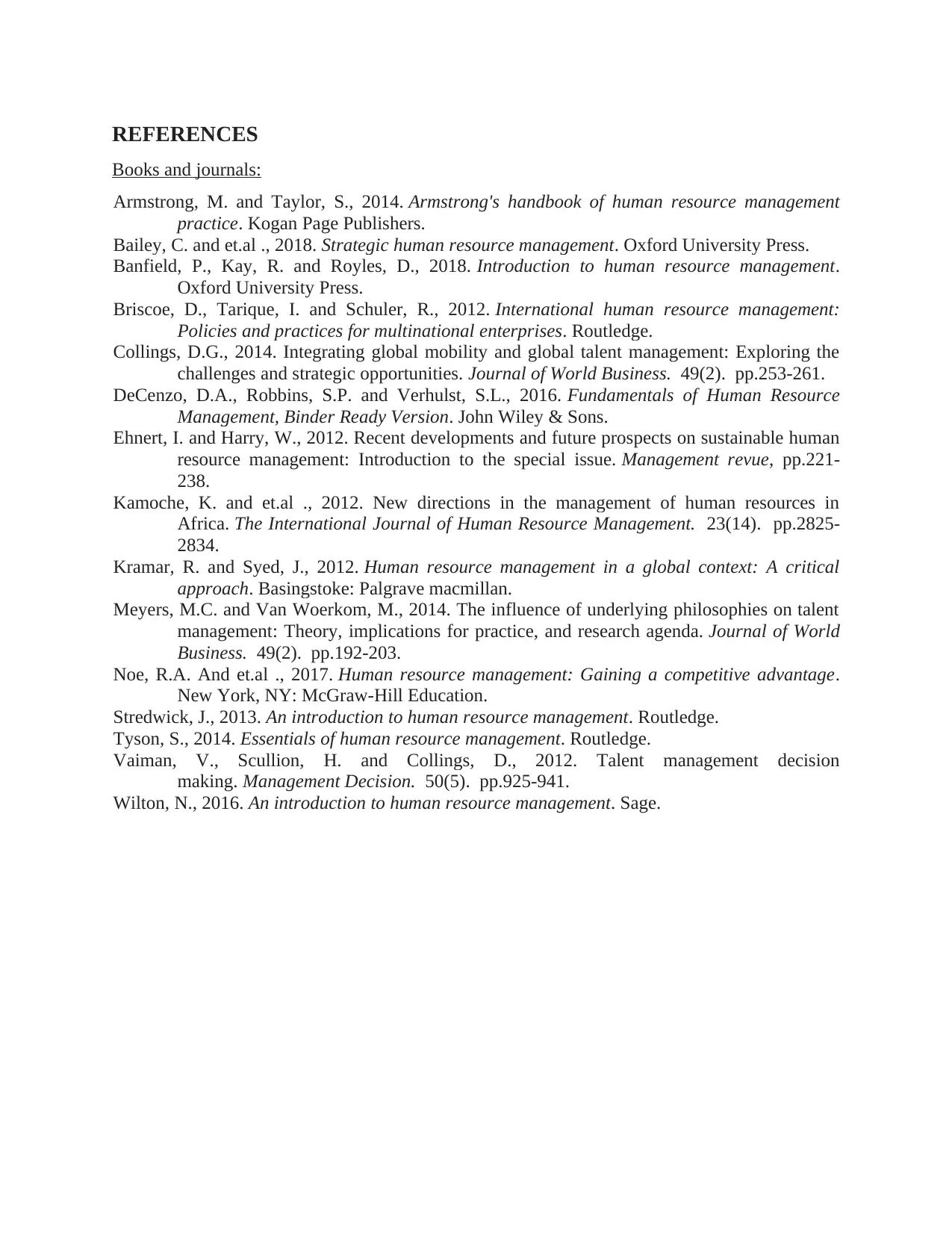
REFERENCES
Books and journals:
Armstrong, M. and Taylor, S., 2014. Armstrong's handbook of human resource management
practice. Kogan Page Publishers.
Bailey, C. and et.al ., 2018. Strategic human resource management. Oxford University Press.
Banfield, P., Kay, R. and Royles, D., 2018. Introduction to human resource management.
Oxford University Press.
Briscoe, D., Tarique, I. and Schuler, R., 2012. International human resource management:
Policies and practices for multinational enterprises. Routledge.
Collings, D.G., 2014. Integrating global mobility and global talent management: Exploring the
challenges and strategic opportunities. Journal of World Business. 49(2). pp.253-261.
DeCenzo, D.A., Robbins, S.P. and Verhulst, S.L., 2016. Fundamentals of Human Resource
Management, Binder Ready Version. John Wiley & Sons.
Ehnert, I. and Harry, W., 2012. Recent developments and future prospects on sustainable human
resource management: Introduction to the special issue. Management revue, pp.221-
238.
Kamoche, K. and et.al ., 2012. New directions in the management of human resources in
Africa. The International Journal of Human Resource Management. 23(14). pp.2825-
2834.
Kramar, R. and Syed, J., 2012. Human resource management in a global context: A critical
approach. Basingstoke: Palgrave macmillan.
Meyers, M.C. and Van Woerkom, M., 2014. The influence of underlying philosophies on talent
management: Theory, implications for practice, and research agenda. Journal of World
Business. 49(2). pp.192-203.
Noe, R.A. And et.al ., 2017. Human resource management: Gaining a competitive advantage.
New York, NY: McGraw-Hill Education.
Stredwick, J., 2013. An introduction to human resource management. Routledge.
Tyson, S., 2014. Essentials of human resource management. Routledge.
Vaiman, V., Scullion, H. and Collings, D., 2012. Talent management decision
making. Management Decision. 50(5). pp.925-941.
Wilton, N., 2016. An introduction to human resource management. Sage.
Books and journals:
Armstrong, M. and Taylor, S., 2014. Armstrong's handbook of human resource management
practice. Kogan Page Publishers.
Bailey, C. and et.al ., 2018. Strategic human resource management. Oxford University Press.
Banfield, P., Kay, R. and Royles, D., 2018. Introduction to human resource management.
Oxford University Press.
Briscoe, D., Tarique, I. and Schuler, R., 2012. International human resource management:
Policies and practices for multinational enterprises. Routledge.
Collings, D.G., 2014. Integrating global mobility and global talent management: Exploring the
challenges and strategic opportunities. Journal of World Business. 49(2). pp.253-261.
DeCenzo, D.A., Robbins, S.P. and Verhulst, S.L., 2016. Fundamentals of Human Resource
Management, Binder Ready Version. John Wiley & Sons.
Ehnert, I. and Harry, W., 2012. Recent developments and future prospects on sustainable human
resource management: Introduction to the special issue. Management revue, pp.221-
238.
Kamoche, K. and et.al ., 2012. New directions in the management of human resources in
Africa. The International Journal of Human Resource Management. 23(14). pp.2825-
2834.
Kramar, R. and Syed, J., 2012. Human resource management in a global context: A critical
approach. Basingstoke: Palgrave macmillan.
Meyers, M.C. and Van Woerkom, M., 2014. The influence of underlying philosophies on talent
management: Theory, implications for practice, and research agenda. Journal of World
Business. 49(2). pp.192-203.
Noe, R.A. And et.al ., 2017. Human resource management: Gaining a competitive advantage.
New York, NY: McGraw-Hill Education.
Stredwick, J., 2013. An introduction to human resource management. Routledge.
Tyson, S., 2014. Essentials of human resource management. Routledge.
Vaiman, V., Scullion, H. and Collings, D., 2012. Talent management decision
making. Management Decision. 50(5). pp.925-941.
Wilton, N., 2016. An introduction to human resource management. Sage.
1 out of 11
Related Documents
Your All-in-One AI-Powered Toolkit for Academic Success.
+13062052269
info@desklib.com
Available 24*7 on WhatsApp / Email
![[object Object]](/_next/static/media/star-bottom.7253800d.svg)
Unlock your academic potential
© 2024 | Zucol Services PVT LTD | All rights reserved.





